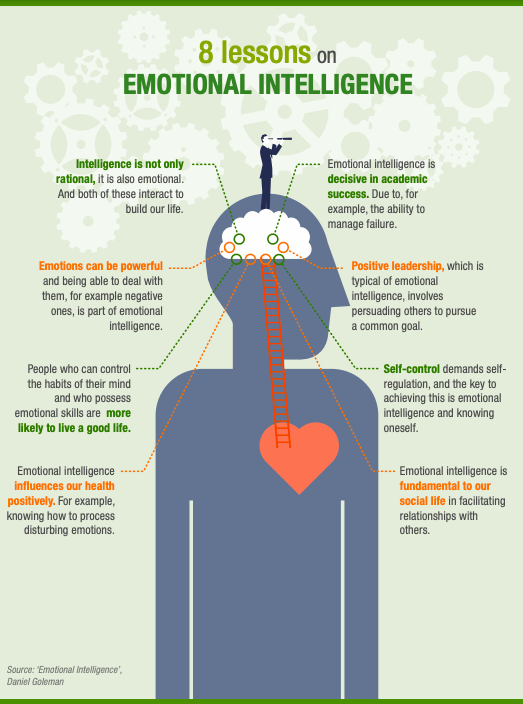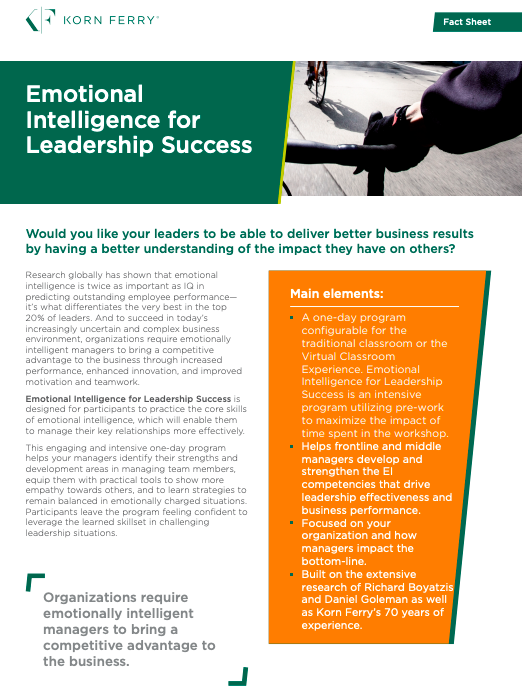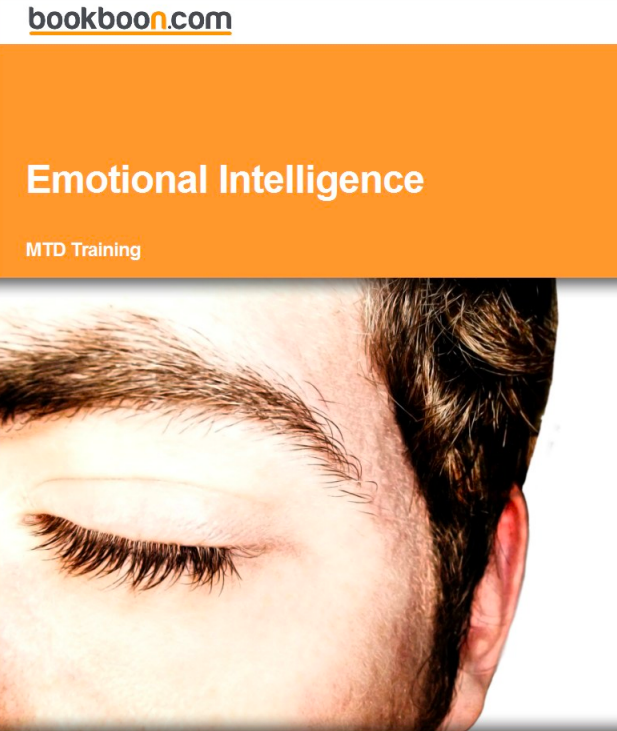What is Emotional Intelligence?
Emotional intelligence is the ability to recognise and understand your own emotions and the emotions of others, and to use this awareness to manage your own behaviour and relationships effectively. It involves being able to identify and express your own emotions in a healthy way, as well as being able to recognise and respond to the emotions of others. Emotional intelligence includes a range of skills, such as empathy, self-regulation, self-awareness, and social skills. It is an important aspect of intelligence that can impact how well a person communicates and relates to others, and can play a role in personal and professional success.
Is emotional intelligence important in the workplace?
Yes, emotional intelligence at work can be important for employers. Research has shown that individuals with high emotional intelligence may be more successful in their careers and relationships compared to those with lower emotional intelligence. This is because emotional intelligence can help people effectively communicate and interact with others, handle conflicts and stressful situations, and make better decisions. These skills can be beneficial in a variety of professional settings, including leadership, teamwork, and customer service.
Additionally, studies have suggested that individuals with high emotional intelligence may be more likely to be engaged and productive employees, as they are better able to navigate the social and emotional aspects of the workplace. This can lead to a positive work environment and contribute to the overall success of the organisation.
Therefore, it is not surprising that many employers place a high value on emotional intelligence when hiring and promoting employees. Some may even include emotional intelligence assessments as part of their hiring or promotion process to identify candidates with these important skills.
What can employers do to improve emotional intelligence among staff?
There are several ways that employers can help improve emotional intelligence among their staff:
- Provide training and development opportunities: Offer training programs or workshops that focus on developing emotional intelligence skills, such as communication, conflict resolution, and self-awareness.
- Encourage open communication: Create an open and supportive work environment where employees feel comfortable expressing their emotions and concerns.
- Encourage empathy: Encourage employees to try to understand and consider the perspectives and emotions of others, both within and outside the organisation.
- Practice mindfulness: Encourage employees to practice mindfulness, which can help improve self-awareness and emotional regulation. This can be done through activities such as meditation or yoga.
- Role model emotional intelligence: As a leader, model emotional intelligence in your own behaviour and interactions with others.
- Recognise and reward emotional intelligence: Encourage and recognise employees who demonstrate high levels of emotional intelligence, and consider including emotional intelligence as criteria for promotions and other opportunities for advancement.
- Foster a positive work culture: Create a positive work culture that values emotional intelligence and encourages the development of these skills.
Is emotional intelligence essential for effective leadership?
Emotional intelligence can be an important trait for effective leadership. Leaders with high emotional intelligence are often able to create positive and productive work environments, as they are able to understand and manage their own emotions and the emotions of others.
For example, leaders with high emotional intelligence may be better able to:
- Communicate effectively with their team
- Build trust and create a positive work culture
- Motivate and inspire others
- Solve problems and make decisions effectively
- Manage conflicts and resolve issues in a constructive manner
In contrast, leaders with low emotional intelligence may struggle with these tasks, which can impact the effectiveness of their leadership and the success of the team or organisation.
Overall, while emotional intelligence is not the only factor that determines effective leadership, it can be an important aspect of a leader’s skill set.
How can employers assess levels of emotional intelligence in potential employees?
There are several ways that employers can assess levels of emotional intelligence in potential employees, including:
- Interview questions: During the interview process, employers can ask questions that probe for emotional intelligence skills, such as “Tell me about a time when you had to deal with a difficult person or situation, and how you handled it.”
- Emotional intelligence assessments: There are a number of assessments that are specifically designed to measure emotional intelligence. These may include self-report questionnaires, personality tests, or role-playing exercises.
- Reference checks: Asking for references from previous supervisors or colleagues can provide insight into an individual’s emotional intelligence skills.
- Job simulation exercises: Employers can also use job simulation exercises that require the candidate to demonstrate emotional intelligence skills, such as handling a difficult customer or resolving a conflict.
It is important to note that no single method is foolproof, and it may be beneficial to use a combination of these approaches to get a well-rounded understanding of a candidate’s emotional intelligence.
Is there a test for emotional intelligence?
Yes, there are a number of tests that are used to measure emotional intelligence. These tests typically involve answering a series of questions or completing tasks that assess different aspects of emotional intelligence, such as self-awareness, self-regulation, motivation, and empathy.
One of the most widely used tests for emotional intelligence is the Mayer-Salovey-Caruso Emotional Intelligence Test (MSCEIT). This test consists of 141 questions that are designed to measure four areas of emotional intelligence: perceiving emotions, using emotions to facilitate thought, understanding emotions, and managing emotions.
Other tests for emotional intelligence include the Emotional Quotient Inventory (EQ-i), the Bar-On Emotional Quotient Inventory (EQ-i 2.0), and the Schutte Self-Report Emotional Intelligence Test (SSEIT).
It is important to note that emotional intelligence is not a fixed trait and can be developed over time through learning and practice. While tests can provide a snapshot of a person’s emotional intelligence at a particular point in time, they should not be considered the sole or definitive measure of a person’s emotional intelligence.
Are women more emotionally intelligent than men?
There is no evidence to suggest that one gender is more emotionally intelligent than the other. Emotional intelligence, or the ability to recognise and understand one’s own and other’s emotions and to use this awareness to manage one’s own behaviour and relationships effectively, is a trait that is found in individuals of all genders and is not limited to any specific group. Research has shown that emotional intelligence can be improved upon and developed over time through experience, education, and self-awareness. It is important to recognise that emotional intelligence can vary widely among individuals within a given gender and that it is not a trait that is specific to any one group.
Can an employee be sacked for lacking emotional intelligence?
It is possible for an employee to be terminated for lacking emotional intelligence, depending on the specific circumstances and the policies of the organisation.
Emotional intelligence at work is a valuable skill that can impact an employee’s effectiveness and the overall culture of the organisation. If an employee’s lack of emotional intelligence is causing problems such as poor communication, conflicts with coworkers, or negative impacts on customer service, it could be considered a valid reason for termination.
However, it is important to note that emotional intelligence can be developed and improved upon over time, and employers should consider providing support and resources to help employees improve in this area before considering termination. It is also important to follow appropriate legal and ethical guidelines when making decisions about termination.
What are the four types of emotional intelligence?
Emotional intelligence is a set of skills that helps a person recognise and understand their own emotions, as well as the emotions of others. It is a key component of social and emotional learning, and it can be beneficial in a variety of settings, including personal relationships, work, and education.
There are four main types of emotional intelligence:
- Self-awareness: This involves being aware of and understanding your own emotions and how they influence your behaviour. People who are self-aware are able to recognise their strengths and limitations, and they are able to manage their emotions effectively.
- Self-regulation: This involves being able to control and manage your emotions and behaviours, particularly in challenging situations. People who are able to self-regulate are able to make decisions thoughtfully and act in a way that is consistent with their values.
- Motivation: This involves using your emotions to drive your actions and reach your goals. People who are highly motivated are able to persevere through challenges and setbacks and stay focused on their objectives.
- Empathy: This involves being able to understand and share the emotions of others. People who are empathetic are able to show compassion and concern for others and are able to communicate effectively with them.
Developing emotional intelligence can help people build stronger relationships, improve communication and problem-solving skills, and increase overall well-being.
How can I improve my emotional intelligence?
There are a number of ways that you can work on improving your emotional intelligence:
- Practice mindfulness: Mindfulness involves paying attention to your thoughts and feelings in the present moment, without judgment. By being more mindful, you can better understand your own emotions and how they influence your actions.
- Develop self-awareness: Pay attention to your thoughts and feelings and how they affect your behaviour. This can help you understand your strengths and limitations and become more self-aware.
- Manage your emotions: Practice techniques such as deep breathing or visualisation to help you manage your emotions in challenging situations.
- Practice empathy: Try to see things from other people’s perspectives and consider their thoughts and feelings. This can help you become more empathetic and understanding of others.
- Set goals and stay motivated: Use your emotions to drive you towards your goals and stay motivated.
- Seek feedback: Ask for feedback from others on how you can improve your emotional intelligence. This can help you identify areas where you may need to work on your skills.
Improving emotional intelligence can take time and effort, but the benefits can be significant. It can help you build stronger relationships, improve communication and problem-solving skills, and increase overall well-being.
What online resources are available for employers who want to learn more about emotional intelligence at work?
There are a number of online resources available for UK employers who want to learn more about emotional intelligence in the workplace. Here are a few examples:
- The Emotional Intelligence Academy: This website (https://www.eiagroup.com/) offers a range of resources and training programs for individuals and organisations looking to improve their emotional intelligence.
- Six Seconds: This organisation (https://www.6seconds.org/) provides resources and training on emotional intelligence for individuals and organisations. They have a UK office located in London.
- The Emotional Intelligence Institute: This organisation (https://e-ii.org/) provides resources and training on emotional intelligence for individuals and organisations. They offer a range of online courses, including a course specifically designed for managers.
- The Centre for Emotional Intelligence: This organisation (https://emotionaldevelopment.co.uk/) provides resources and training on emotional intelligence for individuals and organisations. They offer a range of online courses, including a course specifically designed for leaders.
These resources can provide valuable information and guidance for UK employers who are looking to improve their emotional intelligence and create a positive and supportive workplace culture.








